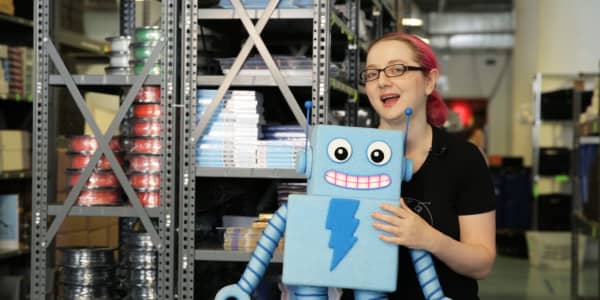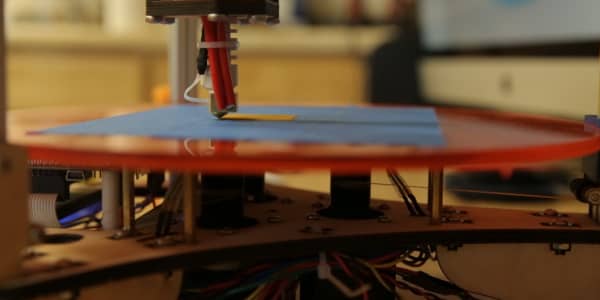Google gets lots of attention for expanding into novel technologies like driverless cars and artificial intelligence. But the technology giant also has put big bucks—more than $2 billion to date—into the next generation of energy production.
Now, the company is in discussions to back the largest wind power project in Africa, a fast-growing but power-starved continent, according to people familiar with the situation.
Google is negotiating to become an investor in the Lake Turkana Wind Power Project, a more than $700 million, 40,000 acre undertaking in Kenya. It's the largest private investment in the history of the East African country—where less than a quarter of the population has access to power—and the project's 310 megawatt capacity is expected to boost Kenya's installed energy capacity by 20 percent.
The deal is not finalized, according to the people, and, even if completed, Google's would be a minority stake.
A spokesman for Google declined to comment, and Turkana representative Rizwan Fazal said, "Google is not involved in LTWP at present and LTWP has no agreement or understanding of any nature with Google."
Most of Google's renewable energy investments have been domestic, largely in wind and solar farms in places like West Texas and California's Mojave Desert. But the environmentally conscious company is increasingly looking outside the U.S.
In 2013, Google invested $12 million in South Africa's Jasper Power Project, one of the largest solar installations on the continent.
Read More Three big takeaways from Google's I/O conference
Google's director of energy and sustainability, Rick Needham, has said publicly the company only pursues investments that both make financial sense and that have "transformative" potential for the growth of clean energy.
"We're investing in clean energy so it's more accessible for our company and for everyone," Google's "Green" website states. "We're helping create a clean energy future that's better for our business and the environment."
While Google's green investments are for profit, its philanthropic arm has supported SolarAid, which is working to build solar access for so-called off-grid African communities.
The positives of small-scale solar aren't lost on other investors, including Zouk Capital and Vulcan Capital (which backed Tanzania-based Off Grid Electric); LGT Venture Philanthropy (which backed Kenya-based M-KOPA Solar); and CrossBoundary Energy (which recently raised an investment fund to finance rooftop solar power for African businesses, both on and off the electrical grid).
Google is hardly new to sub-Saharan Africa. The tech company has offices in Nairobi, Kenya; Accra, Ghana; Lagos, Nigeria; Dakar, Senegal; Johannesburg; and Kampala, Uganda.
While the company's investment would likely be relatively small—perhaps in the tens of millions of dollars, according to the people with knowledge of the talks—it would have broader implications.
One is that Google's involvement could encourage others to follow.
Sophisticated investors are increasingly looking to build power and energy infrastructure on the continent, including private equity firms Blackstone Group, Carlyle Group and Denham Capital. But there have been few so-called exits, when investors in a project cash out by selling their stake to another party.
Since Turkana has already raised all the money it needs, a Google investment—if it plays out—would be a boost of confidence for other investors to know there are buyers once a project is relatively developed.
"As assets mature you will begin to see developers and private equity firms looking to exit transactions to parties looking for steady annuity income," Kwame Parker, head of power and infrastructure for East Africa at South Africa's Standard Bank, said in an email about Google potentially purchasing an existing stake in the wind project.
"Given Google's global profile and the profile of Lake Turkana Wind Farm, a Google investment would be a significant vote of confidence for investors considering African power market entry," added Parker, who helped arrange financing for Turkana (he declined to comment on Google's plans specifically).
Read MoreTesla batteries: A game changer for the grid
Turkana locked in the money it needed in 2014 with a so-called financial close after years of planning. The money raised for the project is broken down into equity stakes, which have higher risk but also higher rewards, and debt, which carries less risk for the lenders. The majority of the equity is held by co-developers KP&P Africa, a group of Dutch and Kenyan businessmen, and power project specialist Aldwych International, which is majority owned by South Africa-based private equity firm Harith.
Other financial backers include the governments of Denmark, Finland and Norway, and Vestas, the Danish wind company making the project's 365 turbines. The African Development Bank and the European Investment Bank also provided debt and other support.
If successful, Turkana also will be a symbol for making renewable energy work for Africa, which is estimated to have the combined installed power generation base of Spain.
"Turkana is a significant opportunity to demonstrate wind at utility scale," Jonathan Berman, CEO of investment and advisory firm J.E. Berman Associates and author of "Success in Africa," said in an email. "If they deliver on time it could prove very attractive for political leaders worldwide who need to rapidly address energy shortfalls."
Bringing in the U.S. government
Another big implication of the Google investment is that it would likely unlock an investment guarantee of up to $250 million from the Overseas Private Investment Corporation—the U.S. government's development finance institution.
OPIC's board announced in June 2014 that it had approved the financing for the project as part of President Barack Obama's Power Africa initiative, which is working to bring in private investors to produce 10,000 megawatts of new energy for the more than 600 million sub-Saharan Africans without power.
A spokesman for OPIC declined to comment, but Turkana, like all other OPIC deals, would require "meaningful involvement of the U.S. private sector," according to its publicly stated mandate. In this case the catalyst would appear to be Google as no other American companies are presently involved.
Not always easy
Turkana was twice named Africa's best renewable energy deal for 2014, but its success wasn't always obvious.
The project was first thought of in 2006 after a local businessman noticed strong area winds. It wasn't until 2014 that construction began after years of negotiations with the government, developers and financial backers.
The location is also remote, requiring a new major road for construction materials to be trucked in, and 250 miles worth transmission lines to take the power out. Both are in progress. The lakeside site was also studied intensely, according to project developers, to consider environmental and social impacts—including a 12-month study to understand the effects on local birds— in addition to making sure the technology would work.
Kenya has also suffered some political instability over the life of the project, especially violence that followed contested a presidential election in late 2007 (terror attacks in 2013 and earlier this year have also been of international concern).
Turkana is scheduled to begin commercial operations in October 2016 with 50 megawatts and hit full 310 megawatt capacity seven months later, according to Fazal.
Lots of investment
Google wouldn't be the only investor in renewable energy on the continent.
One example is U.S.-based private equity firm American Capital Energy & Infrastructure, which announced on Monday that it would invest about $86 million in Senegal's first industrial-scale wind project, a 152-megawatt farm in Taiba Ndiaye, east of Dakar.
"Renewables will play a very big role in providing the power that will drive the economic growth of Africa," said Paul Hanrahan, co-founder and CEO of ACEI, part of $23 billion American Capital.
Other major wind and solar investments in recent years include Actis and Lekela Power, Denham Capital Management and BioTherm Energy, and Inspired Evolution Investment Management and Red Cap.
Top private equity investments in African renewable energy
| Fund Manager | Company | Country | ICB Subsector | Investment Type | Investment ($M) | Date |
|---|---|---|---|---|---|---|
| Actis | Lekela Power | South Africa | Alternative Electricity | Growth | 220 | Feb-15 |
| Denham Capital Management | BioTherm Energy | South Africa | Alternative Electricity | Growth | 150 | Oct-08 |
| Harith General Partners | Lake Turkana Wind Project | Kenya | Alternative Electricity | Growth | 70 | Mar-14 |
| Inspired Evolution Investment Management | Red Cap | South Africa | Alternative Electricity | Growth | 21 | Dec-10 |
| Vantage Capital | Mabele Fuels | South Africa | Alternative Fuels | Mezzanine | 17 | Jan-14 |
| Metier | Genesis/Mainstream | South Africa | Alternative Electricity | Growth | 16 | Jul-14 |
| Metier | AE-AMD Renewable Energy | South Africa | Alternative Electricity | Growth | 2 | Feb-13 |
| Novastar Ventures | SolarNow | Uganda | Renewable Energy Equipment | Venture Capital | 1 | Oct-14 |
| Zouk Capital | Off Grid Electric | Tanzania | Alternative Electricity | Growth | N/A | Dec-14 |
| Metier | ACWA Power Solafrica Bokpoort CSP | South Africa | Alternative Electricity | Growth | N/A | May-13 |
| EFG Hermes Private Equity | Ridgewood Egypt | Egypt | Alternative Electricity | Buyout | N/A | Dec-09 |
Source: Source: EMPEA. Data as of 31 March 2015. Published 28 April 2015. Deals since 2008.
Read MorePay-as-you-go solar power takes off in Africa
Correction: This story has been updated to better describe the title of Jonathan Berman.





